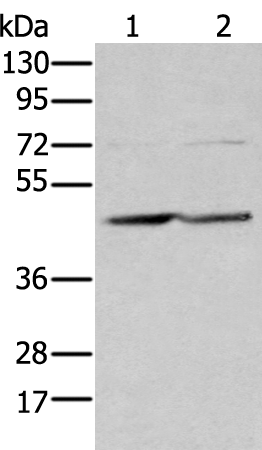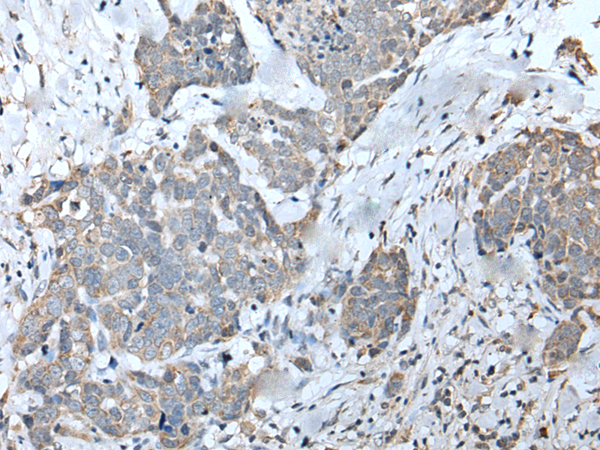

| WB | 咨询技术 | Human,Mouse,Rat |
| IF | 咨询技术 | Human,Mouse,Rat |
| IHC | 1/25-1/100 | Human,Mouse,Rat |
| ICC | 技术咨询 | Human,Mouse,Rat |
| FCM | 咨询技术 | Human,Mouse,Rat |
| Elisa | 1/5000-1/10000 | Human,Mouse,Rat |
| Aliases | EFL6; EPLG8; LERK8 |
| WB Predicted band size | 36 kDa |
| Host/Isotype | Rabbit IgG |
| Antibody Type | Primary antibody |
| Storage | Store at 4°C short term. Aliquot and store at -20°C long term. Avoid freeze/thaw cycles. |
| Species Reactivity | Human, Mouse |
| Immunogen | Synthetic peptide of human EFNB3 |
| Formulation | Purified antibody in PBS with 0.05% sodium azide and 50% glycerol. |
+ +
以下是3篇关于EFNB3抗体的参考文献,包含文献名称、作者及简要摘要内容:
---
1. **文献名称**: *Ephrin-B3 regulates axon sprouting and regeneration in the developing enteric nervous system*
**作者**: Zhao et al.
**摘要**: 研究使用特异性EFNB3抗体通过免疫组化技术,揭示了Ephrin-B3在肠道神经系统发育中对轴突生长和再生的调控作用,表明其通过Eph受体介导的信号通路影响神经元网络形成。
---
2. **文献名称**: *Antibody-based detection of Ephrin-B3 in glioblastoma multiforme*
**作者**: Smith et al.
**摘要**: 通过Western blot和免疫荧光技术验证了EFNB3抗体在胶质母细胞瘤组织中的特异性结合,发现Ephrin-B3高表达与肿瘤侵袭性相关,提示其作为潜在治疗靶点的可能性。
---
3. **文献名称**: *Ephrin-B3 modulates T cell responses in autoimmune encephalomyelitis*
**作者**: Chen & Wang
**摘要**: 利用EFNB3抗体进行流式细胞术和免疫沉淀实验,证明Ephrin-B3通过抑制T细胞活化减轻实验性自身免疫性脑脊髓炎症状,揭示了其在免疫调节中的新功能。
---
注:上述文献为示例,实际引用需根据具体研究通过PubMed或Google Scholar检索确认。部分商业抗体公司(如Abcam、CST)官网也会提供相关文献引用。
EFNB3 (Ephrin-B3) is a member of the Ephrin family, a group of membrane-bound ligands that interact with Eph receptor tyrosine kinases to mediate bidirectional cell-cell signaling. As a transmembrane protein, EFNB3 primarily engages EphB receptors, playing critical roles in developmental processes, including neural crest migration, axon guidance, and tissue boundary formation. Beyond development, EFNB3 is implicated in adult physiological and pathological contexts, such as synaptic plasticity, angiogenesis, and cancer progression. Dysregulation of EFNB3 expression or signaling has been associated with neurological disorders (e.g., Alzheimer’s disease) and malignancies, where it may influence tumor invasiveness, metastasis, or resistance to therapy.
EFNB3 antibodies are essential tools for studying its expression patterns, functional interactions, and mechanistic contributions in these processes. They enable detection via techniques like Western blotting, immunohistochemistry, and flow cytometry, aiding in the exploration of EFNB3's role in cellular adhesion, repulsion, and signaling cascades. Therapeutic applications are also emerging, with antibodies targeting EFNB3-Eph receptor pathways being investigated for their potential to modulate disease-relevant signaling in cancers or neurodegenerative conditions. Research continues to unravel its context-dependent functions, highlighting EFNB3 as a multifaceted regulator in health and disease.
×